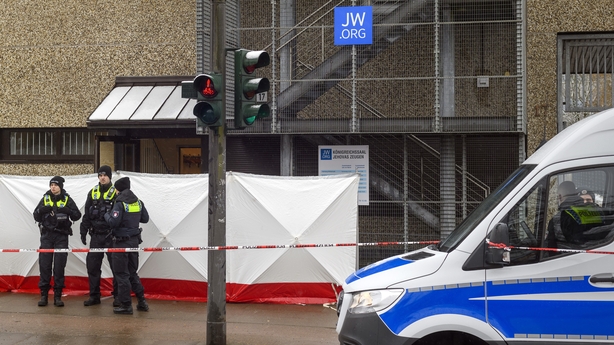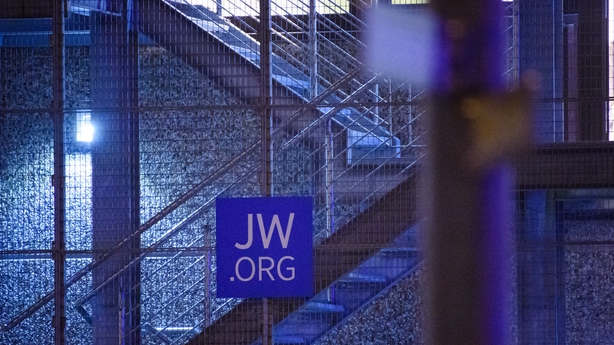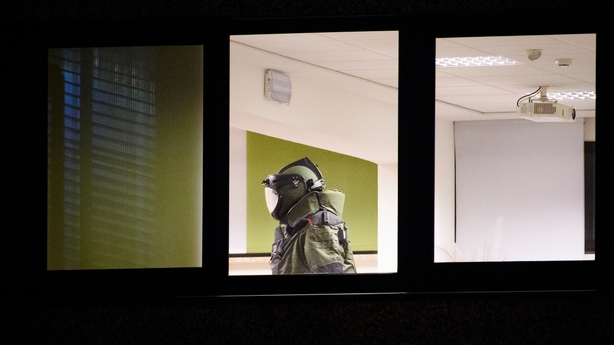A gunman in Germany shot dead seven people including an unborn baby before killing himself at a Jehovah's Witness worship hall in the city of Hamburg, police and prosecutors have said.
The 35-year-old, a German citizen and former Jehovah's Witness, used a semi-automatic pistol he had legally owned since December in the shooting yesterday evening, a Hamburg state prosecutor said at a joint news conference with police.
The victims included four men and two women, and an unborn baby girl, the prosecutor said.
Hamburg police said the mother survived.
Officials said the motive remained unknown, but a political reason had been ruled out. Police who raided his flat after the shooting found 15 loaded magazines of ammunition.

The officials said about 50 people were at an event held in the Jehovah's Witness Kingdom Hall in the Alsterdorf district ofthe city when the shooting started.
When police arrived, the shooter ran to the floor above and took his own life, the officials said, praising police for a quick response they said possibly avoided more deaths.
We need your consent to load this rte-player contentWe use rte-player to manage extra content that can set cookies on your device and collect data about your activity. Please review their details and accept them to load the content.Manage Preferences
The gunman entered the Kingdom Hall building when around three dozen people were attending a service and another 25 people had joined on livestream.
The first distress calls reached emergency services at 9.04pm local time last night, and police forced their way into the Jehovah's Witness building minutes later.
The police action interrupted the shooting, prompting the attacker to flee to the first floor of the building where he killed himself, said regional interior minister Andy Grote.
"We can assume that (the rapid police action) saved many lives," he added.
The building, a nondescript block in a residential area, has been used by the group as a place of worship for several years, local resident Annelore Peemueller told Reuters.
Phone footage from another resident showed a person outside the building shooting in through a window.
"I heard loud gunshots," said the witness, who declined to give his name. "I saw a man shooting at a window with a firearm."

Television footage showed dozens of police cars as well as fire engines blocking off streets and some people, wrapped in blankets, being led by emergency service workers onto a bus.
"There were 12 continuous shots," another witness told reporters. "Then we saw how people were taken away in black bags."
The mayor of Hamburg expressed shock.
"I extend my deepest sympathy to the families of the victims. The forces are working at full speed to pursue the perpetrators and clarify the background," Peter Tschentscher said on Twitter.

Germany has been rocked by several attacks in recent years, both by jihadists and far-right extremists.
Among the deadliest committed by Islamist extremists was a truck rampage at a Berlin Christmas market in December 2016 that killed 12 people.
The Tunisian attacker, a failed asylum seeker, was a supporter of the Islamic State jihadist group.
Europe's most populous nation remains a target for jihadist groups in particular because of its participation in the anti-Islamic State coalition in Iraq and Syria.
Between 2013 and 2021, the number of Islamists considered dangerous in the country had multiplied by five to 615, according to interior ministry data.
But Germany has also been hit by several far-right assaults in recent years, sparking accusations that the government was not doing enough to stamp out neo-Nazi violence.
In February 2020, a far-right extremist shot dead 10 people and wounded five others in the central German city of Hanau.
And in 2019, two people were killed after a neo-Nazi tried to storm a synagogue in Halle on the Jewish holiday of Yom Kippur.

